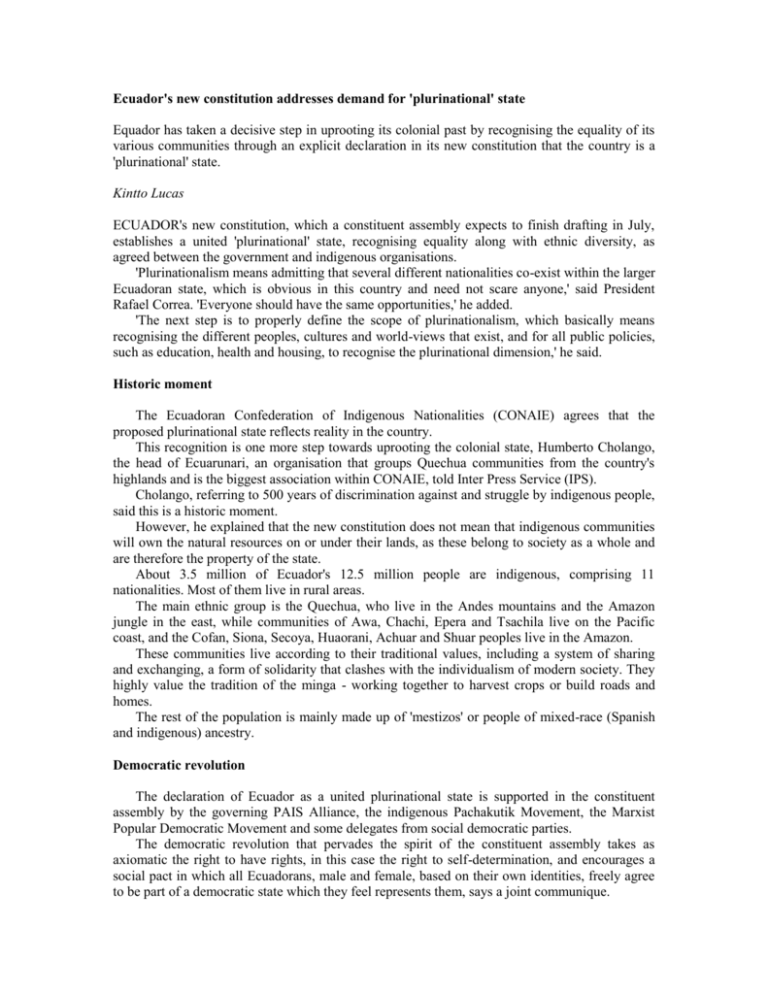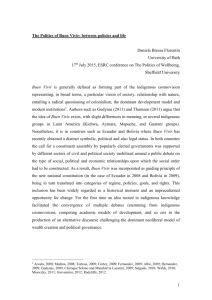Ecuador`s new constitution addresses demand for `plurinational` state
advertisement

Ecuador's new constitution addresses demand for 'plurinational' state Equador has taken a decisive step in uprooting its colonial past by recognising the equality of its various communities through an explicit declaration in its new constitution that the country is a 'plurinational' state. Kintto Lucas ECUADOR's new constitution, which a constituent assembly expects to finish drafting in July, establishes a united 'plurinational' state, recognising equality along with ethnic diversity, as agreed between the government and indigenous organisations. 'Plurinationalism means admitting that several different nationalities co-exist within the larger Ecuadoran state, which is obvious in this country and need not scare anyone,' said President Rafael Correa. 'Everyone should have the same opportunities,' he added. 'The next step is to properly define the scope of plurinationalism, which basically means recognising the different peoples, cultures and world-views that exist, and for all public policies, such as education, health and housing, to recognise the plurinational dimension,' he said. Historic moment The Ecuadoran Confederation of Indigenous Nationalities (CONAIE) agrees that the proposed plurinational state reflects reality in the country. This recognition is one more step towards uprooting the colonial state, Humberto Cholango, the head of Ecuarunari, an organisation that groups Quechua communities from the country's highlands and is the biggest association within CONAIE, told Inter Press Service (IPS). Cholango, referring to 500 years of discrimination against and struggle by indigenous people, said this is a historic moment. However, he explained that the new constitution does not mean that indigenous communities will own the natural resources on or under their lands, as these belong to society as a whole and are therefore the property of the state. About 3.5 million of Ecuador's 12.5 million people are indigenous, comprising 11 nationalities. Most of them live in rural areas. The main ethnic group is the Quechua, who live in the Andes mountains and the Amazon jungle in the east, while communities of Awa, Chachi, Epera and Tsachila live on the Pacific coast, and the Cofan, Siona, Secoya, Huaorani, Achuar and Shuar peoples live in the Amazon. These communities live according to their traditional values, including a system of sharing and exchanging, a form of solidarity that clashes with the individualism of modern society. They highly value the tradition of the minga - working together to harvest crops or build roads and homes. The rest of the population is mainly made up of 'mestizos' or people of mixed-race (Spanish and indigenous) ancestry. Democratic revolution The declaration of Ecuador as a united plurinational state is supported in the constituent assembly by the governing PAIS Alliance, the indigenous Pachakutik Movement, the Marxist Popular Democratic Movement and some delegates from social democratic parties. The democratic revolution that pervades the spirit of the constituent assembly takes as axiomatic the right to have rights, in this case the right to self-determination, and encourages a social pact in which all Ecuadorans, male and female, based on their own identities, freely agree to be part of a democratic state which they feel represents them, says a joint communique. This is not a question of specific territorial divisions, since the state is united and indivisible. Any interpretation of territorial autonomy would lack any legal basis and validity and there would be no instrument to enforce it, the statement adds. Collective rights, which will be included in the Charter of Rights, the new constitution and the laws, will establish forms of administration, functioning and self-government for nations and peoples in their own territories, without implying that they have property rights over nonrenewable resources in the sub-soil, it adds. Also included is the existing consensus that the state will promote multiculturalism, which fortifies societies and encourages different cultures and lifestyles to live together in harmony, says the statement. Indigenous struggle The first time constitutional changes of this kind were proposed was in 1986, when the Socialist Party proposed them in Congress, including the declaration of Ecuador as a plurinational state. It also proposed making Quechua an official language, recognising ancestral territories and traditional medicine, appointing indigenous people to positions of authority and promoting multicultural bilingual education. Although that initiative failed, it did set guidelines and an agenda for the subsequent work of indigenous movements. In June 1990, CONAIE launched a national uprising at Inti Raymi, the solar solstice festival. Indigenous people blocked highways, occupied public offices and buildings, and peacefully occupied the church of Santo Domingo, in Quito, to raise demands for a solution to conflicts over land. The protest marked the beginning of a new era for indigenous people in Ecuador, who became a social and political force to be reckoned with. 'From that point on, the idea of declaring a plurinational state gained momentum. The concept was tied to the struggle for land and the agrarian revolution, that is to say, the need for structural reform of Ecuadoran agriculture, which in turn involves access to water, markets and credit,' Luis Macas, former head of CONAIE and a leader of the 1990 uprising, told IPS. 'When we organised to build unity among our peoples and win basic rights to improve living conditions, we never lost sight of the fact that the state we live in does not satisfy the demands of the majority of the population. That's why we talked about building a different state, a plurinational state,' he said. In Macas' view, proclaiming a plurinational state is important so that Ecuador can recognise itself as it really is, and acknowledge its diversity, which is a key factor in achieving harmony among Ecuadorans. The united plurinational state assumes that citizenship is the basic link uniting the people of Ecuador, although they may belong to different nations or peoples. Non-renewable natural resources are the property of the state, but communities have the right to be consulted as to whether or not they are in agreement with the extraction of sub-soil resources, and to be fully informed of the impact that mining, oil production and other activities will have on their lives. The 1998 constitution recognises the Ecuadoran state as multicultural and multiethnic, and within the definition of 'collective rights' it refers to indigenous peoples as 'peoples who by selfdefinition are nations with ancestral roots', but it does not include the term 'plurinational'. - IPS








